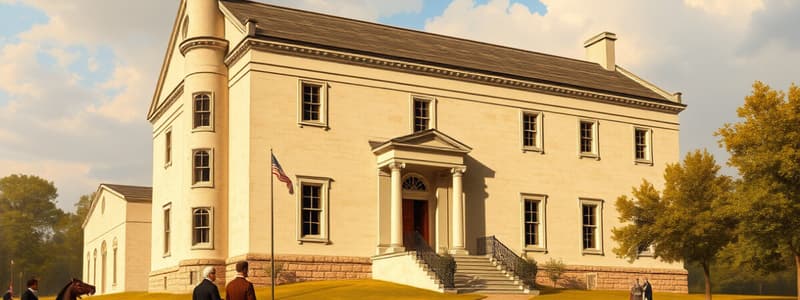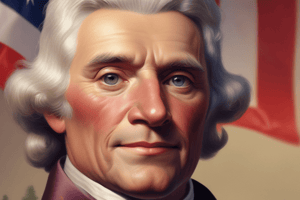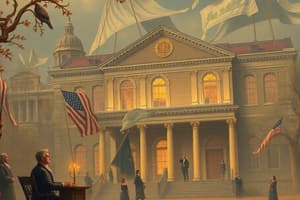Podcast
Questions and Answers
What were the key features of Jefferson's Presidency?
What were the key features of Jefferson's Presidency?
Maintained national bank and debt plan of Hamilton, limited central government, reduced size of military, eliminated number of federal jobs, repealed excise taxes, and lowered national debt.
What was the Louisiana Purchase?
What was the Louisiana Purchase?
A territory that included land through which the Mississippi and Missouri rivers flowed, important for the Port of New Orleans.
Why did people in the western frontier depend on the Mississippi River?
Why did people in the western frontier depend on the Mississippi River?
They relied on the river for transporting goods.
What was a consequence of the Louisiana Purchase?
What was a consequence of the Louisiana Purchase?
What did the Lewis and Clark Expedition achieve?
What did the Lewis and Clark Expedition achieve?
What was the result of the Case of Marbury vs Madison?
What was the result of the Case of Marbury vs Madison?
Jefferson supported the Alien and Sedition Acts.
Jefferson supported the Alien and Sedition Acts.
What led to Jefferson's reelection in 1804?
What led to Jefferson's reelection in 1804?
What prompted the Embargo Act of 1807?
What prompted the Embargo Act of 1807?
Macon's Bill No. 2 replaced the ______ Act of 1809.
Macon's Bill No. 2 replaced the ______ Act of 1809.
What was the Treaty of Ghent?
What was the Treaty of Ghent?
The Federalist party remained a major force after the War of 1812.
The Federalist party remained a major force after the War of 1812.
Which of the following were causes of the War of 1812?
Which of the following were causes of the War of 1812?
What legacy did the War of 1812 leave for the United States?
What legacy did the War of 1812 leave for the United States?
Flashcards are hidden until you start studying
Study Notes
Jefferson's Presidency
- Preserved Hamilton's national bank and debt plan.
- Advocated limited central government: reduced military size, eliminated federal jobs, and repealed excise taxes, lowering national debt.
- Experienced first four years without significant discord while maintaining U.S. neutrality.
Louisiana Purchase
- Acquired territory with valuable land along the Mississippi and Missouri rivers, particularly the Port of New Orleans.
- Initially claimed by Spain, returned to France under Napoleon in 1800.
- Napoleon's ambitions to restore French power in the Americas were hindered by conflict with Britain and a slave rebellion in Santo Domingo.
U.S. Interest in the Mississippi River
- Western frontier settlers relied on river transport for goods.
- In 1802, Spain closed New Orleans to American vessels, revoking previously granted rights, prompting fears of foreign control over U.S. trade routes.
Negotiations: Louisiana Purchase
- Jefferson sent ministers to France to offer $10 million for New Orleans and surrounding land.
- Napoleon needed funds for war and proposed selling the entire Louisiana Territory for $15 million, which was accepted.
Constitutional Predicament of Louisiana Purchase
- Jefferson's strict interpretation of the Constitution conflicted with the lack of a clause permitting presidential land purchases.
- Ultimately submitted the treaty for Senate approval, asserting authority within treaty-making powers.
Consequences of Louisiana Purchase
- Doubled the size of the United States, removed European presence from borders, and extended the western frontier.
- Strengthened Jefferson's vision of an agricultural economy and increased his popularity.
- Weakened the Federalist Party, now perceived as ineffective.
Lewis and Clark Expedition
- Commissioned by Jefferson to explore the Mississippi West before the Louisiana Purchase, enhancing geographic knowledge and establishing U.S. claims to the Oregon Territory.
- Improved U.S.-Indian relations and provided valuable maps for future settlers.
John Marshall
- Chief Justice of the Supreme Court appointed in the last months of Adams' presidency.
- Strengthened the central government through landmark decisions at the expense of state rights.
Case of Marbury vs Madison (1803)
- Jefferson opposed Federalist judges and instructed Madison not to deliver their commissions, leading to Marbury's lawsuit.
- Marshall ruled the Judiciary Act of 1789 unconstitutional, establishing judicial review and consolidating power in the judiciary.
Judicial Impeachments
- Jefferson worked to undermine Federalist judges through impeachment, but faced limited success.
- The threat of impeachment made judges cautious in their rulings.
Jefferson Reelection
- Jefferson won reelection in 1804 by a significant margin, capturing 162 of 176 electoral votes.
Aaron Burr
- Jefferson's Vice President in his first term, Burr was not re-elected for a second term.
- Involved in a conspiracy with Federalists to secede and was later acquitted of treason charges by Marshall.
Barbary Pirates
- North African pirates were combated by Jefferson, who opted for military action over payment, leading to conflicts from 1801 to 1805 that increased respect for U.S. naval power.
Challenges to U.S. Neutrality
- British and French hostilities disrupted trade and neutral rights during the Napoleonic Wars, resulting in impressment of American sailors.
Chesapeake-Leopard Affair (1807)
- A British ship attacked the U.S. Chesapeake, killing three and impressing four sailors, provoking U.S. outrage and a diplomatic response from Jefferson.
Embargo Act 1807
- Banned American trade with foreign ports in hopes of pressuring Britain, but resulted in significant economic hardship for the U.S., leading to its repeal in 1809.
Madison's Presidency
- Jefferson supported Madison's presidency after two terms but faced challenges such as Federalist gains in Congress following dissatisfaction with the embargo.
Nonintercourse Act of 1809
- Allowed trade with all countries except Britain and France, attempting to mitigate the economic fallout from the Embargo Act.
Macon's Bill No. 2 (1810)
- Reopened trade with Britain and France but stipulated that the U.S. would cease trade with the other if one respected neutrality.
Napoleon's Decision
- Napoleon's promise to respect U.S. neutrality led Madison to embargo trade with Britain, which he subsequently violated by continuing to seize American ships.
Causes of War - Free Seas and Trade
- U.S. frustration with both British impressment and French aggression fueled calls for war, with public sentiment often favoring the French.
Causes of War - Frontier Pressures
- Western expansion aspirations led settlers to push Native Americans aside, with figures like Tecumseh attempting to unite tribes against U.S. encroachment.
Causes of War - War Hawks
- Young Democratic-Republicans, led by Henry Clay and John C. Calhoun, pushed for military action against Britain, arguing for national honor and territorial expansion.
Declaration of War of 1812
- Madison declared war after prolonged British delays in addressing U.S. grievances regarding neutral rights, with an ironic twist as Britain had agreed to some terms before the declaration.
Divided Nation
- Support for declaring war primarily came from the South and West, with significant opposition from New England states.
Election of 1812
- Madison was re-elected amid evident divisions over the war, with the Democratic-Republican strength in the South and West overcoming anti-war sentiments in the North.
Opposition to the War of 1812
- Labelled "Mr. Madison's War," opposition came primarily from New England merchants and Federalists worried about expanding Democratic-Republican power.
War of 1812 - Invasion of Canada
- American invasion efforts into Canada suffered from poor planning and execution, with initial offensives failing to capture key territories.
Naval Battles
- The U.S. Navy achieved successful engagements attributed to superior shipbuilding and determined sailors, leading to crucial victories on the lakes.
Chesapeake Campaign
- In response to earlier conflicts, British forces captured and burned Washington D.C. but were ultimately repelled at Baltimore, leading to the composition of "The Star-Spangled Banner."
Southern Campaign
- Andrew Jackson's leadership in the South dismantled British-allied tribes and culminated in a battle that occurred after the war had technically ended due to the signing of a treaty.
Treaty of Ghent (1814)
- Signed on Christmas Eve, the treaty ended the war without addressing grievances, re-establishing pre-war conditions and boundaries.
Hartford Convention
- New England Federalists met to discuss secession due to dissatisfaction with the war, leading to proposals that ultimately weakened their influence.
The War's Legacy
- The war increased U.S. national respect, solidified Canada’s status within the British Empire, and marked the decline of the Federalist Party.
- Established a precedent for discussions on nullification and secession while catalyzing American industrial development and promoting national pride through war heroes.
Studying That Suits You
Use AI to generate personalized quizzes and flashcards to suit your learning preferences.




